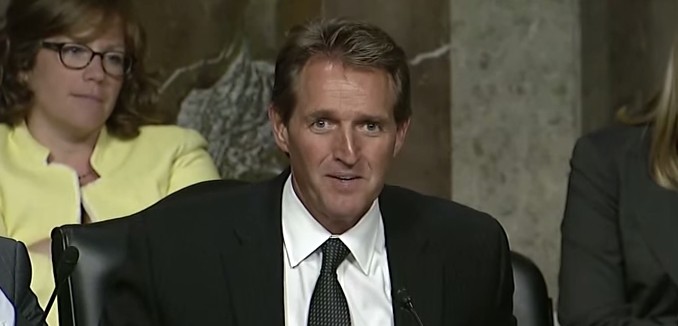Sen. Jeff Flake (R – Ariz.) will vote against the nuclear deal with Iran, known as the Joint Comprehensive Plan of Action (JCPOA), despite being lobbied “heavily” by President Obama and his administration, Politico reported Saturday.
It doesn’t look like President Barack Obama will get to claim “bipartisan support” for the Iran nuclear deal, either.
On Saturday, Sen. Jeff Flake, possibly the only Republican in Congress open to supporting the agreement, said he won’t. …
The president also courted Flake heavily on the Iran deal, including inviting him along on a recent trip to Africa. (The White House declined to give any details on last-minute lobbying of Flake; State officials did not immediately respond to request for comment.)
Flake, a member of the Senate Foreign Relations Committee, announced his opposition to the JCPOA in a press release Saturday, in which he expressed his concern about the administration’s “reluctance” to challenge Iran’s interpretation of the recently concluded nuclear deal.
“While I have supported the negotiations that led to the JCPOA from the beginning, I cannot vote in support of this deal. The JCPOA does contain benefits in terms of limiting Iran’s ability to produce sufficient fissile material for a nuclear weapon for a period of time, particularly at its known nuclear facilities. But these benefits are outweighed by severe limitations the JCPOA places on Congress and future administrations in responding to Iran’s non-nuclear behavior in the region.
“While Congress has received assurances from the administration that it does not forfeit its ability to impose sanctions on Iran for behavior on the non-nuclear side, these assurances do not square with the text of the JCPOA.
In particular, Flake worried that any future sanctions Congress may consider in relation to Iran’s non-nuclear aggression would be treated by Tehran as a pretext for opting out of the JCPOA.
“Iran has already stipulated that it will view the imposition of new or similar sanctions as a breach of the JCPOA. Given the administration’s reluctance to challenge Iran’s interpretation of the JCPOA before it is implemented, I am concerned that the administration will be even more reluctant to confront Iran on its regional behavior once the JCPOA is being implemented, as doing so may give Iran license to forgo its nuclear obligations under the JCPOA. As written, this agreement gives Iran leverage it currently doesn’t have.
Flake pointed out that the nuclear deal is not a treaty, which has mechanisms to allow Congress to clarify issues.
During the Senate hearing last month over the JCPOA, Flake emphasized his concern that the agreement limits Congress’ ability to sanction Iran. A video of his questioning is embedded below.
“While some of my questions were answered in today’s hearing, some were not. I’m concerned that some of the answers given by the administration are not reflected in the text of the agreement,” said Flake. “In particular, I want to be sure that Congress’ right to impose sanctions on Iran for reasons unrelated to the nuclear issue is maintained. In future hearings, I look forward to discussing the broader foreign policy implications of moving ahead, or not moving ahead, with this agreement.”
[Photo: Sen. Jeff Flake / YouTube ]




